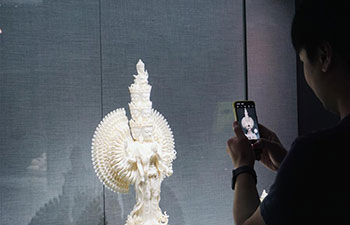SYDNEY, Aug. 23 (Xinhua) -- One of the world's largest brain blood clot banks is set to help researchers uncover vital clues in the fight against strokes.
Launched in Sydney on Friday, the New South Wales (NSW) State Brain Clot Bank already has 95 blood clot samples and over the next four years, the hi-tech facility aims to collect around 1400 specimens from donors.
Focusing specifically on a particularly kind of brain blood clot that occurs in up to 40 percent of all stroke patients, NSW Brain Clot Bank chief investigator Sonu Bhaskar told Nine Co. Newspapers that treatment of cryptogenic stroke is often difficult because the exact origin of the blood clot remains a mystery to researchers.
"The whole platform has been designed with a single ambition or mission - to improve the outcomes of patients with stroke in NSW, Australia and then globally," he said.
"We can potentially make a dent in at least knowing where the clots are coming from, and whether that has potential in clinical decision-making," he added.
Up until now, it's been difficult for stroke researchers Down Under to study "hot samples," but with the new facility opening up, NSW Health Pathology's principal scientist Associate Professor Killingsworth explained that the opportunity for more hands-on examination may pave the way for some major breakthroughs.
"(Using) amazing analytical systems which can break these clots down into an almost single-molecule level, we can understand what's exactly making up the clot, where it came from and how it's interacting with normal tissue in the brain," he said.
As well as laboratory testing, the NSW Brain Clot Bank will also create a digital database available for scientists all over the globe to view.
"We're very proud to say this will be a fully open-access digital resource which will be available to anyone in the world," Killingsworth said.
"Traditionally a lot of researchers are very protective of their data, and we both believe by throwing this open to everyone we're going to get the best input from the rest of the world," he added.

















